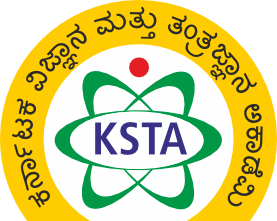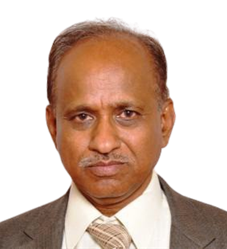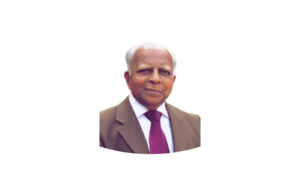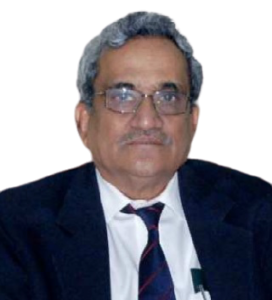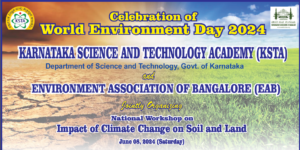National Education Policy – 2020: Pro. K. Balaveera Reddy
15 min read- Education should be imparted with a view to the type of society that we wish to build. We are working for a modern democracy built on the values of human dignity and equality.
– Dr. Sarvepalli Radhakrishnan
The world is undergoing rapid change. The education system is evolving rapidly in response to social, economic and technological innovations and various scientific and technological advances such as big data, machine learning and artificial intelligence are expecting a workforce with multidisciplinary capabilities including science, social science and humanities. In addition, it is also essential to have universally applicable, thinking, learning, working and other 21st century skills. It is aimed to make India, which has the world’s largest educational network and the world’s fifth largest economy, a global knowledge superpower. Towards this the Government of India has recently brought out new ‘National Education Policy-2020’ (NEP-2020). This article describes the views of NEP and its impact on India’s education sector.
The Indian higher education system ranks third globally, with US and China occupying the top two positions. At present, there are 982 universities (UGC, 2021) including central, state, private and deemed universities and more than 53,000 colleges in India with more than 3.8 crore students enrolled in them. The current total enrollment ratio in India is 26.5% . The objective of the National Education Policy (NEP)-2020 is to increase this to 50% by 2035 and improve the quality of education and become global education centre.
As Prime Minister Narendra Modi says, National Education Policy will set the foundation for 21st century India. This policy ensurs Indians more empowered and easily attractive to opportunities. We are moving to an era where an individual will not be stuck to a single profession all his life. Thus, he will continuously need to re-skill and up-skill himself. National Education Policy is formulated keeing this in mind.
Vision of National Education Policy
This National Education Policy envisions an education system rooted in Indian ethos that contributes directly to transforming India sustainably into an equitable and vibrant knowledge society, by providing high-quality education to all, and thereby making India a global knowledge superpower.
The Policy envisages that the curriculum and pedagogy of our institutions must develop among the students a deep sense of respect towards the fundamental duties and constitutional values, bonding with one’s country, and a conscious awareness of one’s roles and responsibilities in a changing world.
The vision of the Policy is to instill among the learners a deep-rooted pride in being Indian, not only in thought, but also in spirit, intellect, and deeds, as well as to develop knowledge, skills, values, and dispositions that support responsible commitment to human rights, sustainable development and living, and global well-being, thereby reflecting a truly global citizen.
The Fundamental Principles of the NEP
The fundamental principles that will guide both the education system and individual institutions are:
- Multidisciplinary and a holistic education- in order to ensure the unity and integrity of all knowledge and encouragement for multidisciplinary learning
- Synergy – bringing synergy in curriculum at all levels of education across the country
- Flexibility – learners can choose their own paths in life according to their talents and interests
- Ethics and human and constitutional values – bringing righteousness and human and constitutional values among students
- Creativity and critical thinking to encourage logical decision making and innovation
- Life skills – communication, cooperation, teamwork, and resilience, etc.
- Focus on regular formative assessment for learning
- Encouragement for outstanding research
- Extensive use of technology in teaching, learning and evaluation
- A ‘light but tight’ regulatory framework to ensure integrity, transparency, and resource efficiency through autonomy, good governance and empowerment
- Emphasis on conceptual understanding instead of monotonous education and test-based education
- Promoting multilingualism and the power of language in teaching and learning
- Respect for diversity and respect for the local context in all curriculum, pedagogy, and policy,
- Full equity and inclusion education
- Teachers and faculty as the heart of the learning process
- A rootedness and pride in India, and its rich, diverse, ancient and modern culture and knowledge systems and traditions
- Education is a public service. access to quality education must be considered a basic right of every child
- Substantial investment in a strong, vibrant public education system
- Key Changes to the Current System
Major Changes in the Present System
In this policy, the following major changes have been made to the present system to provide high quality higher education and re-energize the education system:
- Moving towards a higher educational system consisting of large, multidisciplinary universities and colleges
- Moving towards a more multidisciplinary undergraduate education
- Moving towards faculty and institutional autonomy
- Revamping curriculum, pedagogy, assessment and student support for enhanced student experiences
- Reaffirming the integrity of faculty and institutional leadership
- Establishment of a National Research Foundation
- Governance of higher education institutions by high qualified independent boards having academic and administrative autonomy
- “Light but Tight” regulation by a single regulator for higher education
- Increased access, equity, and inclusion
Holistic and Multidisciplinary Education
National Education Policy is a comprehensive document. Its main objective is to improve the education system by making it inclusive, integrated, multidisciplinary and more productive. India has a long tradition of holistic and multidisciplinary learning, from universities such as Takshashila and Nalanda, to the extensive literatures of India combining subjects across fields. Holistic and Multidisciplinary Education will help develop well-rounded individuals that possess critical 21st century capacities. Multiple entry and exit points, thus, removing currently prevalent rigid boundaries and creating new possibilities for life-long learning. Increased faculty and institutional autonomy in setting curricula. The structure and duration of degree programmes are matched with multiple entry and exit options. India’s education system needs such comprehensive and multidisciplinary education to take the country towards the 21st century and fourth industrial revolution.
Institutional Restructuring
It is aimed to increase the Gross Enrolment Ratio in higher education including vocational education from 26.3% (2018) to 50% by 2035. Each of multidisciplinary universities, colleges, and HEI clusters/Knowledge Hubs, will aim to have 3,000 or more students. The present complex nomenclature of HEIs in the country such as ‘deemed to be university’, ‘affiliating university’, ‘affiliating technical university’, ‘unitary university’ shall be replaced simply by ‘university’. Gradually, over a period of fifteen years, through a system of graded autonomy‘, the system of affiliated colleges’ will be phased out. A mechanism for granting graded autonomy to colleges through a transparent system of graded accreditation will be established.
Three category of Institutions
The main thrust of this policy regarding higher education is to end the fragmentation of higher education by transforming higher education institutions into large multidisciplinary universities, colleges, and HEI clusters/Knowledge Hubs. Three category of institutions are:
- Research-intensive Universities: Equal emphasis on high quality teaching and high quality research
- Teaching-intensive Universities: Greater emphasis on teaching but still conduct significant quality research
- Autonomous Degree-grating Colleges: Multidisciplinary colleges that grants undergraduate degree and is primarily focused in undergraduate teaching

Higher education institutions will have the autonomy and freedom to move gradually from one category to another based on the plans, action and effectiveness Model public universities for holistic and multidisciplinary education, at par with IITs, IIMs, etc., called MERUs (Multidisciplinary Education and Research Universities) will be set up and will aim to attain the highest global standards in quality education. They will also help set the highest standards for multidisciplinary education across India.

Transforming the Regulatory System of Higher Education
The regulation, accreditation, funding and academic standard setting of higher education will be performed by distinct, independent, and empowered bodies. These four independent structures will be set up under the Higher Education Commission of India (HECI).

The professional councils, such as the Indian Council for Agricultural Research (ICAR), Veterinary Council of India (VCI), National Council for Teacher Education (NCTE), Council of Architecture (CoA), National Council for Vocational Education and Training (NCVET) etc., will act as Professional Standard Setting Bodies (PSSBs) and do not have any regulatory role. They will play a key role in the higher education system and will be invited to be members of the GEC

Effective Governance and Leadership
Through a suitable system of graded accreditation and graded autonomy, and in a phased manner over a period of 15 years, all HEIs in India will aim to become independent self-governing institutions. Upon receiving the appropriate graded accreditations, a Board of Governors (BoG) shall be established
Establishment of National Research Foundation
The overarching goal of the NRF will be to enable a culture of research in HEIs, research laboratories and other research institutions. The NRF will be governed, independently of the government, by a rotating Board of Governors consisting of the very best researchers and innovators across fields. The primary activities of the NRF will be to:
- Fund competitive, peer-reviewed grant proposals of all types and across all disciplines;
- Seed, grow, and facilitate research at academic institutions where research capabilities are currently limited
- Act as a liaison between researchers and relevant branches of government as well as industry
- Department of Science and Technology (DST), Department of Atomic Energy (DAE), Department of Bio-Technology (DBT), Indian Council of Agriculture Research (ICAR), Indian Council of Medical Research (ICMR), Indian Council of Historical Research (ICHR), and University Grants Commission (UGC), as well as various private and philanthropic organizations, will continue to independently fund research according to their priorities and needs.
- Recognise outstanding research and progress
Internationalization
Having a larger numbers of international students studying in India and provide greater mobility to students in India who may wish to visit, study at, transfer credits to, or carry out research at institutions abroad, and vice versa. Promote India as a global study destination providing premium education at affordable costs. Facilitate research/teaching collaborations and faculty/student exchanges with high-quality foreign institutions. High performing Indian universities will be encouraged to set up campuses in other countries and similarly, selected universities e.g., those from among the top 100 universities in the world will be facilitated to operate in India and a legislative framework facilitating such entry.
Structure and duration of degrees
A. Non-professional degrees: undergraduate degree will be of either 3 or 4-year duration, with multiple exit options. within this period, with appropriate certifications. The 4-year programme may also lead to a degree ‘with Research’ if the student completes a rigorous research project in their major area(s) of study as specified by the HEI
B. Non-professional Master’s programmes:
HEIs will have the flexibility to offer different designs of Master’s programmes: There may be a 2-year programme with the second year devoted entirely to research for those who have completed the 3-year Bachelor ’s programme; (b) for students completing a 4-year Bachelor ’s programme with Research, there could be a 1-year Master’s programme; and (c) there may be an integrated 5-year Bachelor’s/Master’s programme. Undertaking a Ph.D. shall require either a Master’s degree or a 4-year Bachelor’s degree with Research. The M.Phil. programme shall be discontinued.

Professional Education
Preparation of professionals must involve an education in the ethic and importance of public purpose, an education in the discipline, and an education for practice. Professional education is an integral part of the overall higher education system. Stand-alone agricultural universities, legal universities, health science universities, technical universities and stand-alone institutions in the other fields, shall to become multidisciplinary institutions offering holistic and multidisciplinary education. India must also take the lead in preparing professionals in cutting-edge areas that are fast gaining prominence, such as Artificial Intelligence (AI), 3-D machining, big data analysis, and machine learning, in addition to genomic studies, biotechnology, nanotechnology, neuroscience, with important applications to health, environment, and sustainable living that will be woven into undergraduate education for enhancing the employability of the youth.
Structure and Duration of of Technical Education Degrees
The current professional bachelor and master degree programs are 4 and 2 years respectively. which can be redesigned as a 3-year bachelor degree and a 2-year master degree. Some examples of professional degree courses

* 1st year PG program can be completed in 3rd and 4th year UG programs. Thus, saving 1 year of PG period.
Professional Degrees: The degree will be of either 3 or 4-year duration, with multiple exit options with appropriate certifications. Students of 5 years multidisciplinary program will get the degree with advanced internship and research. Students of the 5-year multidisciplinary Bachelor’s programme with internship and research will get degree. Similarly, the duration of Bachelor and Master degree may be redesigned as below:
- a. 5 and 2 years (Such as BArch and MArch)
- b. 5 and 3 years (Such as BDS and MDS)
- c. 5 ½ and 3 years (sucha s MBBS and MD or MS)
Technology in Education
Education is playing a crucial role in India’s global reach in information and communication technology including other cutting-edge fields such as space and also in success of digital India campaign. Similarly, technology is playing an important role in the improvement of educational processes and outcomes; thus, the relationship between technology and education at all levels is bi-directional.
An autonomous body, the National Educational Technology Forum (NETF), is being created to provide a platform for the free exchange of ideas on the use of technology to enhance teaching-learning, assessment, planning and administration. Technology will be implemented at all levels of the education system to improve classroom processes, support teachers’ professional development, streamline academic planning, administration and management. Technology based educational platforms, such as DIKSHA/SWAYAM will be integrated across higher education. Active role in conducting research on Disruptive Technologies and create institutional materials and courses including online courses in cutting edge domains
Online Education and Digital Education
New circumstances and realities require new initiatives. The recent Covid19 pandemic made us to realise this. We have to ready with alternative modes of quality education whenever and wherever traditional and in-person modes of education are not possible.
A dedicated unit for the purpose of orchestrating the building of digital infrastructure, digital content and capacity building will be created in the Ministry of Education (MoE) to look after the e-education needs of both school and higher education.
Teachers and National Education Policy 2020
Teachers truly shape the future of our children – and, therefore, the future of our nation. It is because of this noblest role that the teacher in India was the most respected member of society. Society gave teachers, or gurus, what they needed to pass on their knowledge, skills, and ethics optimally to students. The motivation and empowerment of teachers is required to ensure the best possible future for our children and our nation.
Role of Teachers in New Policy
The role of teacher in shaping the minds of the younger generation is very important. Hence, teachers must be passionate, motivated, and well qualified, and well trained in content, pedagogy, and practice. Apart from this a teacher has to play many roles in new paradigm.
- To understand the significance of education in general and higher education in particular, in Indian and global context
- To anchor designing, developing, creating & managing content, implementing and evaluation of all training & development programs.
- To keep abreast with latest developments in their specific and to develop human resources with latest developments in their specific field of specialization. To sharpen and improve the art of modern teaching-learning methodologies.
- To instill ethical & moral values and promote lifelong learning opportunities for all its human resources.
- To promote the use of ICT, multimedia technologies including Interactive multimedia, 3D animation, Virtual realities techniques in teaching-learning process. To promote use of in teaching-learning process (Delivery style, Content, Presentation, Etiquette, Attitude, Board work, Class management etc.).
- To expand & promote programs for other Universities, States, Governments and Corporates. To develop Networking of institutions engaged in similar activity and to play supportive and collaborative role to enhance quality of higher education.
- To acquire & improve the art of teaching to achieve the goals of higher education. To develop model curriculum & syllabi for each course.
- To understand the organization & management of a College/ University, perceive the role of teachers in the total system and to participate accordingly.
- To establish strategic alliance with several learning places (between colleges, different centers of excellence, business, industry, services, government etc.,). Organizing pre-deployment training and in-service training for teachers and staff
- Organizing orientation, refresher, short-term courses, workshops, seminars and other communication programs for university faculty in higher education.
- To establish centers for training, research, training evaluation and such other activities as may be necessary.
- To undertake, aid, promote and coordinate research and training on its own or through other agencies.
- To continually undertake skill /competency mapping of existing academic and non-academic staff associated with higher education.
- To provide adequate opportunities for up skilling and re-skilling of academic and non-academic staff so that they are competitive to meet up the highly dynamic nature of global higher education systems.
- To develop world class learning resources center to cater to the informational needs of the academic staff.
- To nurture creativity, IPR and Patent culture
- HEls shall move to a criterion -based grading system that assesses student achievement based on the learning goals for each programme.
- Assessment from high stakes examinations towards more continuous and comprehensive evaluation.
- Set up high quality support centres to encourage and support students from socio-economically disadvantaged background.
- Set up professional academic and career counselling to ensure physical, psychological and emotional well being.
- Multidisciplinary institution of higher learning – UG and PG programmes with high quality teaching, research and community engagement.
- Open and distance learning programmes.
- Value based education.
- Internationalization of education – through institutional collaborations.
- Technology based education platforms, such as DIKSHA/SWAYAM – integrated across higher education.
- Active role in conducting research on disruptive technologies.
- Online courses in cutting edge domains and Research – linkages with higher learning institutions.
- Establishment of Academic Bank of Credit (ABC) – digitally store the academic credits earned by various recognized HEls
Conclusion
Today we are in the era of Globalization. Globalization, a double edged sword, boon or a bane. Effect of this on India is mixed, more tilted towards negative. Manufacturing base is diminishing. Job scenario is changing significantly. Number of jobs available has shrunk greatly due to recession. However, the direction to Higher Education System will change during the next few decades. A comprehensive and multidisciplinary education system will be established with a “Great Convergence” in all disciplines of Higher education in next few years. There will be radical changes in higher education by emphasizing on skill-based education. Skilled knowledge with innovation efficient human resources, instant decision-making active leadership, knowledge-based industries, skill development programs, techno-entrepreneurship and 21st century skills can overcome a lot of the problems we are facing today.
Skill Development: Some important skill development programs are
- Analysis and Design Skills
- Application skills
- Knowledge Engineering Skills
- Organisational Skills
- Interpersonal Skills
- Communication capacity
- Entrepreneurship Skills
- Other Special Skills
21st Century Skills: The following list provides brief on knowledge skills, career and character commonly associated with 21st century skills.
- Critical thinking, problem solving, reasoning, analysis, explanation, information interpretation skill.
- Research skills, practicality and questioning
- Creativity, artistry, curiosity, imagination, innovation, personal expression
- Perseverance, self-direction, planning, self-discipline, adaptability, initiative, verbal and written communication, public speech and presentation, logical action
- Leadership, team work, collaboration, cooperation, ability to use virtual system
- Information and Communication Technology (ITC) Literacy, Media and Internet Literacy, Data Analysis, Computer Programming
- Awareness of civic value, moral and social justice
- Entrepreneurship, Economic and Financial Literacy
- Global awareness, multicultural literacy, humanity
- Scientific literacy and reasoning, adoption of scientific method
- Environment and Conservation Literacy, Ecosystem Understanding
- Health and Wellness Literacy – Nutrition, Diet, Exercise and Public Health & Safety
Techno-entrepreneurship
Techno entrepreneurship is a newest developing trend. Technology entrepreneurship is a vehicle that facilitates prosperity in individuals, firms, regions, and nations. Cultivating the seeds of young entrepreneurs always ends up with harvesting employment opportunities and economic development of community. It has upstream and downstream multiplier effect outnumber the direct employment. Its development requires the adoption of national and state industrial policies in addition to appropriate training methods and development of skilled knowledge force and good techno entrepreneurs.
The 21st century belongs to India and our country will play the role of Vishwaguru. We need to have the talent and skill capabilities required for techno entrepreneurship. More than a billion people are our huge resource. Let us make India a developed nation by promoting job creators and leaders at all levels.
Bharat Ratna Sir Mokshagundam Visvesvaraya, better known as Sir MV, observed that “well-equipped industries, efficient managers, trained technologists and skilled workers are the true wealth of the nation”. His proclaims “Industrialise or Perish”; “Work more and Produce More”;” Support Indian Industries”; “Think in Terms of Nation” shows his clear view of empowering India.
“Adopt Technology or Lose Importance” is very relevant for today’s society. Hence, “Techno-entrepreneurs are the creators of wealth and employment”.
Our ancient India had the world famous universities like Nalanda, Taxila, Vikramashila, Vallabhi, etc., and attracted the greatest scholars around the world with high standards of multi-displinary teaching and research. The ancient education system has given the world great scholars like Charaka, Sushruta, Aryabhata, Varahmihira, Bhaskaracharya, Patanjali, Nagarjuna, etc., who has made their most valuable contributions in various fields such as mathematics, astronomy, metallurgy, medical science and surgery, construction, architecture, shipbuilding and navigation, yoga, fine arts, chess, etc. Indian culture and philosophy have had a strong impact on the world. Under the external invaders, our ancient time-tested education system was destroyed and westernised. After independence, successive Governments tried to introduce new education policies to bring back the glory of our country. Recently, the Government of India has introduced the ambitious National Education Policy-2020, which has widened the scope of providing autonomy to institutions to bring in high standards. My Dear Professor/Friends, here we have wonderful/great opportunity to contribute to the successful implementation of the National Education Policy-2020 and be part of the process of bringing back glory. Come and let’s all join hands.
Prof. K. Balaveera Reddy
Member, Karnataka Science and Technology Academy
Former Chancellor, Visvesvaraya Technical University, Belgaum
Chairman, Governing Body, National Institute of Public Utilities Karnataka, Suratkal
